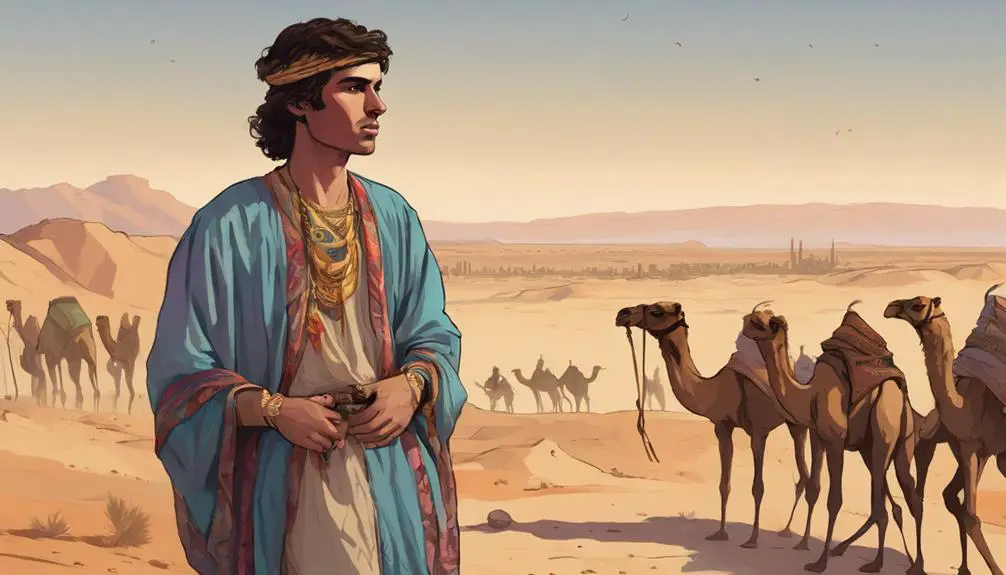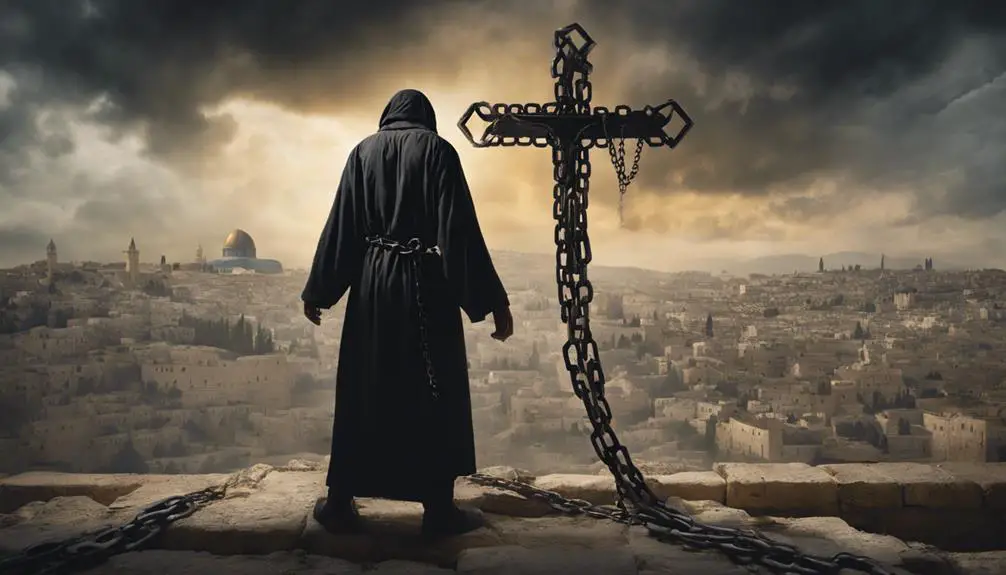Discover the profound stories and hidden meanings behind biblical names starting with 'B', and embark on a journey into their timeless wisdom.

Names That Start With B in the Bible
In the tapestry of biblical narratives, names that start with 'B' weave through the fabric like threads of gold, each holding its own unique story and significance. You might find yourself intrigued by the likes of Benjamin, who represents the youngest son's resilience and favored status, or Bathsheba, whose tale intertwines with the themes of power and redemption.
There's Barnabas, the encourager, whose presence uplifts many, and Boaz, whose actions lay the groundwork for the lineage of kings. And then there's Barabbas, a figure shrouded in controversy and debate. Each name opens a door to a corridor filled with history, mystery, and lessons that still resonate today, inviting you to explore further the depths of their stories and the impact they hold.
Key Takeaways
- Biblical names starting with "B" represent figures pivotal in themes of redemption, transformation, and community leadership.
- Figures like Benjamin and Bathsheba embody reconciliation and moral complexity, influencing key narrative shifts.
- Leaders such as Barnabas and Boaz showcase the power of encouragement, integrity, and compassion in biblical communities.
- Each "B" name carries unique insights into the roles of grace, forgiveness, and moral leadership within the biblical context.
The Story of Benjamin

In the biblical narrative, Benjamin stands out as the youngest son of Jacob and Rachel, symbolizing a figure of unity and reconciliation among his brothers. His birth, marked by tragedy with Rachel's death, sets the stage for his significant legacy. You'll find that Benjamin's story isn't just a mere tale of survival but embodies deeper themes of familial bonds and the complexities of brotherhood. His role becomes pivotal in the reconciliation of Joseph with his brothers, highlighting his symbolic significance as a bridge between divided factions.
Benjamin's legacy extends beyond his immediate family narrative to the formation of the Tribe of Benjamin, one of the twelve tribes of Israel. This tribe, derived from his lineage, holds a unique position in the Israelite history. Its members are depicted as fierce warriors, contributing significantly to the collective identity and security of the Israelite confederation. The Tribe of Benjamin's significance is further emphasized through its strategic geographic location and its contributions to the cultural and military fabric of ancient Israel. Understanding Benjamin's legacy, therefore, requires an appreciation of both his personal story and the enduring impact of his descendants on the Israelite nation.
Bathsheba: A Queen's Tale
Bathsheba's tale unfolds as a narrative rich in complexity, power dynamics, and the profound impact of her actions on the biblical kingdom's destiny. You'll find her story intertwined with themes of seduction, moral dilemmas, and ultimately, redemption. At the core, Bathsheba's influence and David's temptation mark pivotal moments that not only shape their lives but also the fabric of their society.
Bathsheba's journey from a rooftop encounter to becoming a queen isn't just a tale of personal transformation but also a demonstration of her significant influence over King David and, by extension, the kingdom itself. Her story highlights:
- The power of influence: Bathsheba's relationship with David shifted the kingdom's political landscape.
- Moral complexity: The narrative doesn't shy away from the morally grey areas, including David's temptation and the subsequent actions taken to ensure their union.
- Resilience and redemption: Despite the trials, Bathsheba emerges as a figure of strength, guiding her son Solomon to the throne.
Analyzing Bathsheba's role reveals a multifaceted character whose impact resonates through biblical history. Her story is a compelling examination of power, consequence, and the ability to influence the course of a nation's destiny.
Barnabas: The Encourager

Transitioning from the story of Bathsheba, we now explore Barnabas, a pivotal figure renowned for his role as an encourager in the early Christian community. Unlike many, Barnabas didn't just offer words of comfort; he embodied the spirit of encouragement through his actions, significantly impacting the spread of Christianity.
Barnabas's journey is deeply interwoven with missionary work. He didn't merely accompany Paul on his missionary journeys; he was instrumental in them. His ability to see potential in others, including Paul, and his insistence on giving them chances, notably with John Mark, showcases his profound influence. Barnabas's encouragement wasn't superficial. It was a catalyst for growth and reconciliation within the early Church.
Moreover, Barnabas's gift of prophecy further set him apart. This wasn't just about foretelling; it was about forthtelling, urging the community towards love and good deeds. His prophetic voice wasn't one of doom but of encouragement, steering the believers not just to see the present but to reach for what could be.
In essence, Barnabas exemplified the power of encouragement backed by genuine faith and action. His life reminds us that encouragement, when deeply rooted in faith and coupled with the gift of prophecy, can transform communities and propel the mission forward.
The Life of Boaz
Shifting our focus, we now examine Boaz, a figure whose actions within the Book of Ruth offer profound insights into the virtues of kindness, leadership, and redemption. Boaz, a wealthy landowner, emerges not just as a model of prosperity but as a beacon of moral and ethical integrity in his community. His interactions with Ruth, a Moabite widow, showcase an exceptional blend of compassion, respect, and adherence to societal norms, all while navigating the complexities of ancient Near Eastern customs.
The narrative highlights several crucial aspects:
- Boaz's wealth isn't merely a backdrop but a tool for benevolence and societal contribution.
- Ruth's loyalty to Naomi, her mother-in-law, sets the stage for her encounter with Boaz, illustrating the intertwining of personal virtue and divine providence.
- The redemption process Boaz undertakes underscores his commitment to righteousness, extending beyond mere legal obligation to genuine care for others' welfare.
Boaz's actions reflect a deep understanding of his societal role, where his resources and influence serve as a means to uphold justice, support the vulnerable, and foster communal harmony. His story, embodying leadership fueled by compassion, continues to inspire, demonstrating how individual character can shape collective well-being.
Barabbas: A Controversial Figure

Among the more enigmatic figures of the New Testament, Barabbas presents a complex study in contrasts, embodying both the political turmoil and the spiritual conflicts of his time. You'll find his story interwoven with the fate of Jesus, making Barabbas' trial a pivotal moment in biblical narrative. This trial, where Pontius Pilate offers the crowd a choice between freeing Barabbas, a known insurrectionist, or Jesus, underscores the political chess game played by Roman authorities and Jewish leaders.
You might wonder why Barabbas, with his background of rebellion and violence, becomes the beneficiary of the crowd's choice, especially when juxtaposed with Jesus' message of peace and forgiveness. This decision highlights the volatile nature of public opinion and the manipulative power of those in authority. Moreover, the redemption theme deeply embedded in this episode is hard to overlook. Barabbas' release, while initially appearing as a miscarriage of justice, subtly mirrors the greater redemption offered to humanity through Jesus' crucifixion.
In essence, you're seeing a narrative where Barabbas' freedom symbolizes the unearned grace available to all, making his story a compelling exploration of forgiveness and redemption in the face of societal and political upheaval.
Frequently Asked Questions
How Do Names Starting With 'B' in the Bible Reflect Cultural or Linguistic Significance in Biblical Times?
You're exploring how certain names reflect cultural or linguistic significance.
It's fascinating that Biblical begettings often chose 'B' names, pointing to their popularity and deeper meanings rooted in ancient times.
These names weren't just labels; they were laden with expectations, heritage, and societal values.
Delving into this, you uncover layers of historical context and linguistic nuances, revealing how every name tells a story, shaping identities and reflecting the rich tapestry of biblical narratives.
Are There Any Prophetic or Symbolic Meanings Associated With Biblical Names Beginning With the Letter 'B'?
As you delve into the depths of biblical numerology significance, you'll find that names beginning with 'B' carry profound prophetic or symbolic meanings. This B name etymology exploration reveals a rich tapestry of insights.
For example, 'Bethel' meaning 'House of God' signifies a divine presence and connection. Such names aren't just labels; they're windows into the souls and destinies of those who bear them, illustrating the adage, 'A name is a story.'
How Have Names Starting With 'B' From the Bible Influenced Modern Naming Trends in Various Cultures?
You've likely noticed how modern naming trends are heavily influenced by biblical names starting with 'B'. This isn't just by chance. Modern adaptations of these names often carry a touch of tradition, blended with contemporary appeal.
Celebrity influences play a significant role, too, as famous figures opting for biblically inspired 'B' names for their children can spark a surge in popularity. This fascinating blend of ancient tradition and modern fame shapes today's naming practices.
Can the Significance of the Initial 'B' in Biblical Names Be Linked to Specific Biblical Events or Teachings?
You're exploring whether the 'b' in biblical names ties to specific events or teachings. It's a deep dive, blending Biblical Branding and Name Numerology to uncover patterns.
This analysis isn't just about letters; it's about how these initial 'b's reflect broader themes or lessons within the texts.
Your approach should be analytical, dissecting each name's significance, how it connects to its narrative, and its potential influence on subsequent cultural naming conventions.
What Are the Variations and Translations of Biblical Names Starting With 'B' Across Different Languages and How Do They Differ in Interpretation?
You're delving into the etymology and translation methodologies of Biblical names, aiming to understand their variations across languages.
By analyzing these names, you uncover how translations differ, reflecting diverse interpretations and cultural influences.
This exploration reveals the complex layers of Biblical name etymology, showcasing how each translation methodology affects the meaning and perception of these names, ultimately offering a richer understanding of their significance and adaptability in various linguistic contexts.
Conclusion
As you've ventured through these biblical narratives, you've unearthed tales that span the spectrum of human experience, from Benjamin's journey of brotherhood and redemption to Bathsheba's intricate dance with power and vulnerability.
Barnabas's unwavering support, Boaz's acts of kindness, and Barabbas's story of freedom and controversy have painted a complex mosaic of faith, morality, and human nature.
Each name, starting with a 'B', serves as a beacon, illuminating the rich tapestry of biblical history and its enduring lessons on life's tumultuous seas.



Sign up